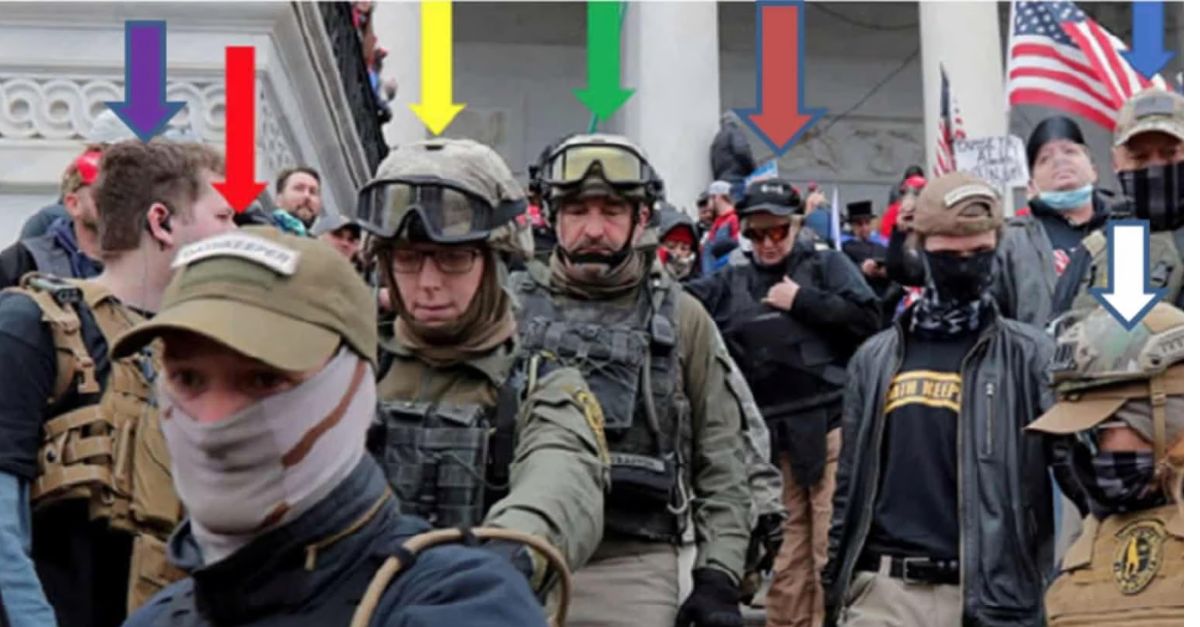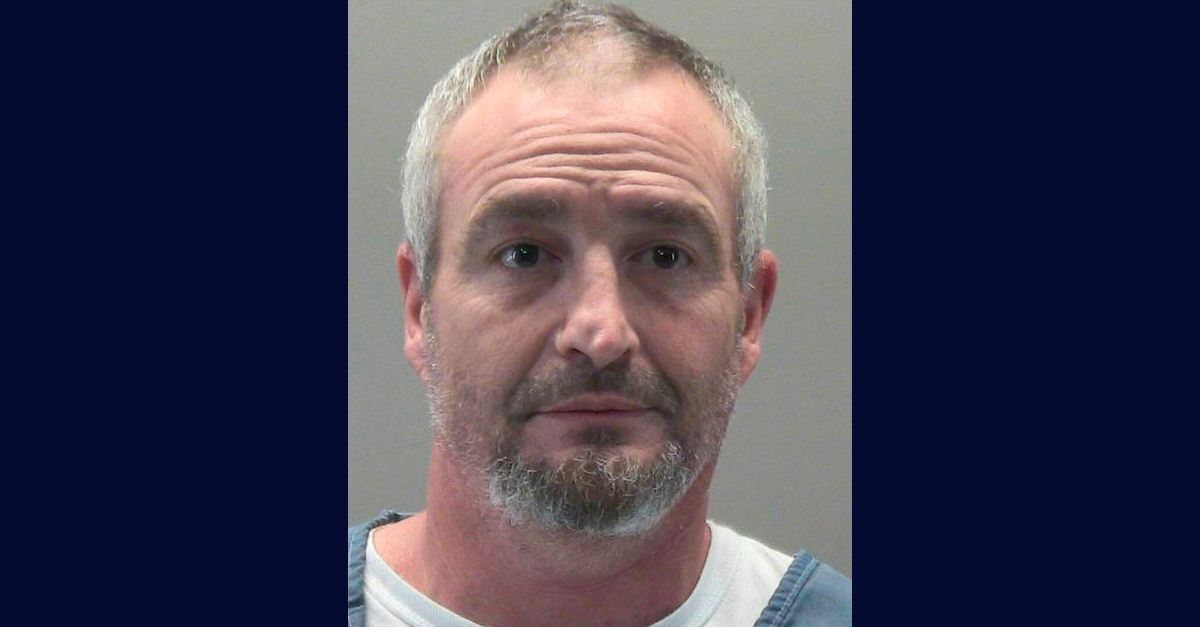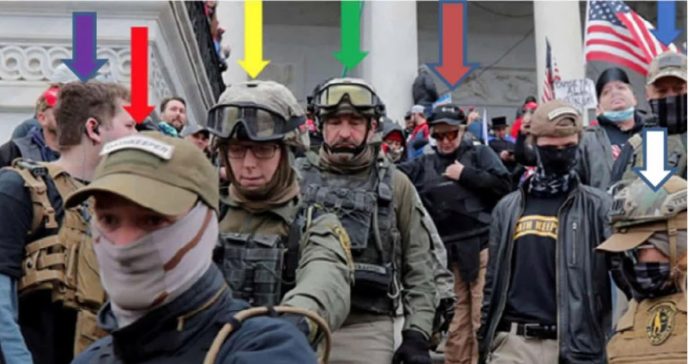
A Justice Department exhibit from the Oath Keepers trial depicts several members who were at the Capitol on Jan. 6. Highlighted with a green arrow is Ohio resident Donovan Crowl. From left to right: David Moerschel identified by red arrow, William Isaacs under purple arrow, Jessica Watkins under yellow arrow, Laura Steele under orange arrow. Kelly Meggs is identified with a blue arrow and Connie Meggs, his wife, identified with white arrow (via DOJ court filing).
As a significant ruling from the U.S. Supreme Court lies just ahead on a controversial charge applied to hundreds of Jan. 6 rioters and former President Donald Trump himself, federal prosecutors have agreed to temporarily delay sentencing for Donovan Crowl, one of the first Oath Keepers charged in the wake of the Jan. 6 attack on the U.S. Capitol.
Crowl, a former U.S. Marine from Ohio, was seen marching up the Capitol steps on Jan. 6, 2021, in a single-file military style “stack” formation with several of his now-convicted Oath Keepers cohorts. He was found guilty at a stipulated bench trial last July before U.S. District Judge Amit Mehta, a Barack Obama appointee.
Mehta, as Law&Crime previously reported, acquitted Crowl’s co-defendant, Broadway actor James Beeks, at that stipulated trial. But according to the statement of facts stipulated to Mehta, Crowl was found guilty of conspiracy to obstruct an official congressional proceeding — specifically, the proceeding to certify the results of the 2020 election — as well as an act to obstruct, impede or interfere with officers carrying out their duties at the Capitol.
Crowl, 50, could have faced a jury like dozens of other Oath Keepers did, including the network’s leader Elmer Stewart Rhodes, Rhodes’ foot soldier on the ground Kelly Meggs — who Crowl followed up the Capitol steps — or Rhodes’ co-defendant and Crowl’s onetime friend, Oath Keepers recruiter Jessica Watkins.
It was established that Crowl did not see communications between Rhodes and other Oath Keepers who vowed to partake in a “civil war.” However, Mehta found Crowl did align himself closely with Watkins on Jan. 6 and that evidence showed he was privy to a conversation with Meggs inside the Capitol when Meggs declared they intended to stop the count. It didn’t help him with the judge either that he came to Washington, D.C., donning tactical gear like a helmet meant for combat and bulletproof vest.
In the days since Crowl’s verdict, Rhodes, Meggs and Watkins, have all been serving out lengthy sentences in prison. Crowl has not. Not yet.
Court records show he was released pending trial in March 2021 under certain conditions and ordered to remain under GPS surveillance. When he was convicted last July, he was expected to be sentenced in November. But he wasn’t. Then, last December, Crowl asked the court to stay his sentencing in light of the Supreme Court granting certiorari to Fischer v. United States. Oral arguments in that matter are scheduled for April 16.

FILE—This undated file photo provided by the Montgomery County Jail shows Donovan Crowl. Crowl and Jessica Watkins, both from Ohio, were arrested Jan. 18, 2021. Watkins and Crowl, two self-described militia members are facing federal charges that they participated in the assault on the U.S. Capitol Jan. 6, 2021. At least 10 Ohioans have been charged in connection with the deadly Jan. 6 insurrection at the U.S. Capitol after being identified through social media and surveillance footage to the FBI. The group includes people linked to the Oath Keepers militia group who have been indicted on charges that they planned and coordinated with one another in the attack. (Montgomery County Jail via AP, File)
Crowl’s sentencing meanwhile has moved multiple times; first set for January 2024, it was postponed to February and then, reset once more for March 22.
The case before the Supreme Court involves Jan. 6 rioter and former Pennsylvania police officer Joseph Fischer, who has asked the high court to resolve whether he was appropriately charged under 18 U.S.C. § 1512(c)(2). That obstruction statute proclaims:
whoever corruptly alters, destroys, mutilates or conceals a record, document or other object, or attempts to do so, with the intent to impair the object’s integrity or availability for use in an official proceeding; otherwise obstructs, influences, or impedes any official proceeding or attempts to do so, shall be fined under this title or imprisoned not more than 20 years, or both.
Fischer, like numerous other Jan. 6 defendants charged under the statute, has argued that the D.C. Circuit misapplied the statute to him because it should only apply to a defendant taking some action with respect to a record or physical document. In his own motion to stay sentencing, Crowl argued that with the felony obstruction statute carrying a severe 20 year max sentence and the only other offense he was convicted of imposing a possible maximum sentence of 5 years, his ask was essential.
He noted too that a ruling involving another Jan. 6 defendant, retired U.S. Air Force officer Larry Brock, favored him. As Law&Crime has previously reported, the appellate court found that in Brock’s case, the lower court had erred and that the “administration of justice” statute, to their reading, only included judicial proceedings — not congressional proceedings such as the certification of the Electoral College’s vote by Congress. Brock was ordered resentenced. In that vein, Crowl says his own sentence deserves consideration.
A review of the district court docket in Washington, D.C., shows federal prosecutors initially opposed the motion. But now that opposition is on ice. The filing entered Tuesday by Crowl’s attorney Carmen Hernandez was done with prosecutors’ consent.
A representative from the Justice Department did not immediately return a request for comment.
Have a tip we should know? [email protected]

